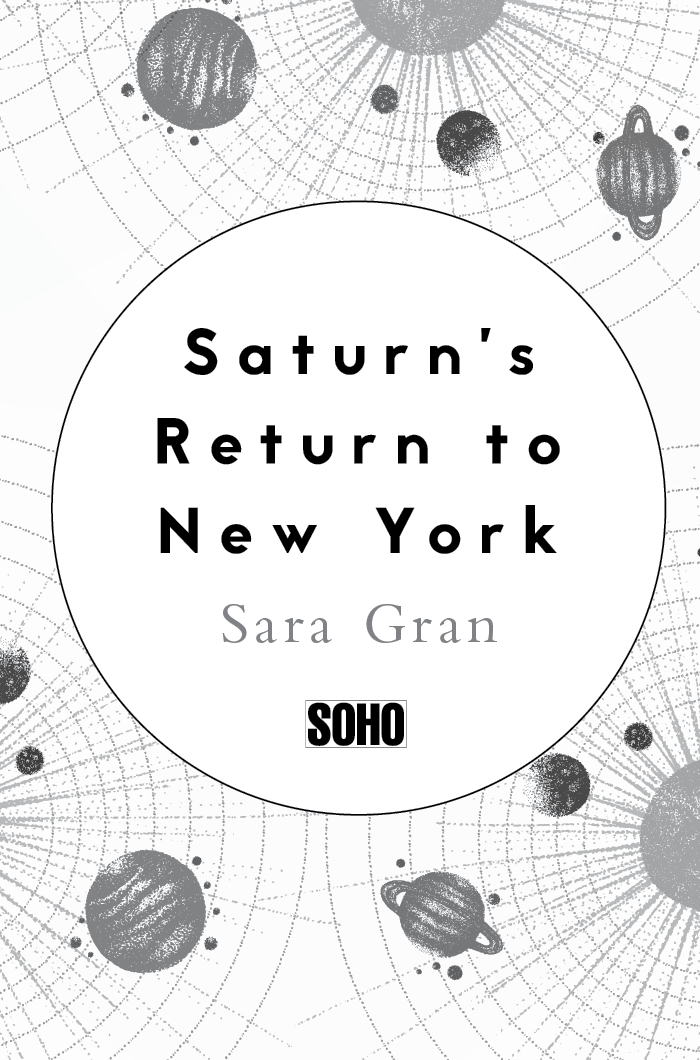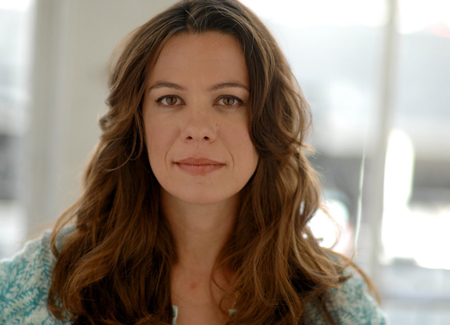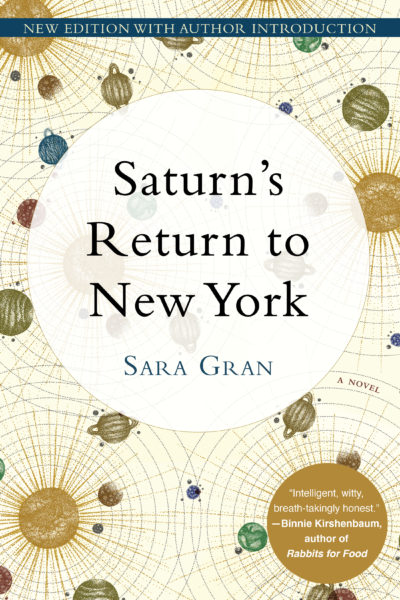
Soho is publishing a new paperback edition of Sara Gran’s remarkable debut novel, Saturn’s Return to New York this month.
The book tells the story of Mary Forrest and how the city in which she lives and the family to which she was born have an outsized influence on her life. As both the city and her family change over time, the way Mary thinks, feels, and experiences the world changes, too.
Gran wrote the wonderful Introduction to this new edition. It is posted below.
“How refreshing to encounter a twenty-something female narrator who is intelligent, witty, breathtakingly honest and in pursuit of neither money nor marriage. Rather, Sara Gran’s Mary is seeking to come to terms with loss and missed connections. A very funny novel, but ultimately a poignant one.”
–Binnie Kirshenbaum, author of Rabbits for Food
About the Book:
Cities and families make up our lives in equal measure: both never stop changing, and both can protect us, hold us—or cut us to the bone. For Mary Forrest, 29, her city and her family are deeply entwined: her mother, Evelyn, is the editor of the most prestigious literary magazine in New York, as much a part of the city as the Chelsea Hotel (now condos) or Green-Wood Cemetery (now five figures per plot). In 1999, as gentrification morphs the neighborhoods Evelyn and Mary have known all their lives, Evelyn’s mind likewise starts to slip away. Mary’s life is going the way of the Automat and Luna Park, and she is furious.
As her city, her mother, and the other touchstones of her life start to fade away, Mary looks for hope in astrology, men, friends, and work. But when all seems lost, it’s time to stop looking for happiness outside, and start looking for the guiding stars within.
Elegiac and elegant, this new edition of Sara Gran’s first novel is introduced by the author.
About the Author:

Sara Gran is the author of the novels Saturn’s Return to New York, Dope, and Claire DeWitt and the City of the Dead, the first in a detective series. Her work has been published in over a dozen countries and in nearly twice as many magazines, newspapers, and literary journals. Born and raised in Brooklyn, Sara Gran now lives in California. Visit her website.
~
Saturn’s Return to New York
Introduction
All of my books are about tough women. Often, my books are about tough women who need to be a little less tough, as is true of the two women in this book, Mary and Evelyn, and was maybe true about me and the brilliant, generous editor of this book, Laura Hruska.
When I first spoke to Laura, I’d wanted to be a writer for a long time (or what seemed like a long time to a young person), and had never published anything. No one dug my work, and few people seemed to dig me. I was twenty-eight, and I felt like I was getting old. Now, from the view of forty-six, twenty-eight looks young. It didn’t feel young. I didn’t have a job. I couldn’t get a job. I’d quit my last bookstore gig out of boredom, thinking I’d pick up another one no problem. But the economy was starting to change and the world was starting to change and I couldn’t find another job. I was too young to know that everything changes, all the time, and the future is never to be counted on, only worried about or not. My father offered to support me for three months while I finished my book. I’d written another book, before, and it was okay but not great. I’d sent it to a couple of people, and that lack of greatness was verified for me by the rejections it got. But a few of the rejections were friendly; most notably, one from Laura Hruska at Soho Press. My heart thrilled at the handwritten note on the manuscript. Something like “great writing, not for us.” Great writing was better than I’d gotten in about seven years. (I also got a kind note from the late, great editor and publisher Barney Rosset, who at the time was trying to get another small press off the ground. I don’t remember all of what his three-line rejection note said, but I remember he used the word lovely to describe my writing. I don’t boast often; I will boast about Barney Rosset calling my writing lovely.)
It was early in the year 2000. I was looking for work and not finding any. My three-month father-sponsored sabbatical was not going well. My mother and father were the oddest combination of generous and cheap I’ve ever met, and my father’s generous offer to support me ended up being a couple of bucks here and there. It was still better than working, and better than what most people get, but I wasn’t making my rent or my bills.
I finished the book (this book). I sent it to Laura and a few other people. I didn’t hear back. No surprise. As I said, I did not feel young, and I did not feel good. I felt like the life I wanted was passing me by. I felt like maybe I’d spend the rest of my life getting up early and squeezing myself onto the subway and trudging through snow to go to a job I hated (if I could find one) and maybe stealing some time for writing on the weekends. Better people than me had done it and are doing it right now. Nothing had ever made me as happy as writing had made me (and nothing ever has since). It was all I wanted to do. It didn’t seem like I’d ever get to do it full time.
I lived in Brooklyn, on the south side of Williamsburg. It was not a fashionable place to live. Brooklyn was still my ugly, rough, hometown, and not yet the suburban fantasy newcomers have warped it into. My boyfriend and I lived in a railroad apartment where the roof leaked and a ceiling fan collapsed and the toilet flushed about two times out of three. The morning of that day I walked a few miles to the Polish 99-cent grocery store in Greenpoint. Maybe it’s still there. Probably not. I could get food there that was cheap and slightly less depressing than the food from Walgreen’s on my corner. I walked to the Polish 99-cent store and bought cherry juice and crackers and I don’t remember what else and on the way back, arms sore from heavy bags, I cried, overwhelmed by self-pity, devoid of hope, furious at life and ashamed of my failures. I was not successful. I was on the road to being poor. I was not popular. My relationship was in a sour spot. My youth and my looks were slipping away like sand. So was my intelligence. Smart is as smart does, and I wasn’t doing much. I wanted to be anywhere but Brooklyn. Now, all this feeling of dread and doom at twenty-something seems dramatic and slightly ridiculous. At the time it all felt very important and very real.
When I got home, still crying, there was a message on my answering machine. It was Laura. She said she’d read the book and wanted me to call her. I stopped crying. I got it together. I called her. She wanted to publish my book. I was alone in my dirty kitchen in my shitty apartment and when we got off the phone I started crying all over again, from happiness and relief.
The year we took to publish this book started off with letters and ended with emails. The editorial process was an afternoon at Laura’s office. I couldn’t believe how easy it all was. Laura was smart and a square dealer. A friend of a friend who was an entertainment lawyer said she was famously tough, and she was. But she was also fair. She gave me a good contract to start with and told me I didn’t need a lawyer or agent (she was right) and compromised on my few minor negotiations. She loved the book. All was well. All was very, very well.
Until we got to bound galleys.
Books go through stages; one cocoon after another after another in between caterpillar and butterfly. You start with the author’s manuscript (author and maybe agent and maybe friends and family have likely given this manuscript a dozen or so reads, each leading to a new draft from the author). Then the editor edits (a process that might and probably will take multiple passes, may or may not involve crying, fighting, and moments of adoration). The copyeditor copyedits (this is not supposed to be a big deal; sometimes it is: on my second and sixth books I had copyeditors who, for mysterious reasons, decided to try some fairly fancy attempts to rewrite my books; they lost and I won; let this be a lesson to any aspiring copy-meddlers reading these pages). Next is the proofreader, who ideally causes no such strong emotions and no drama. From the copyedited or proofread manuscript the first set of bound galleys is created—this a roughly bound and printed copy of the book. Galleys are poorly made but expensive due to their short run. The book is well over 90 percent done by bound galleys. Ideally, it’s more like 99.9 percent done. Ideally, at bound galleys, you’re changing a few commas and catching a few typos and correcting a small handful of errors.
We were at bound galleys when Laura called and said she thought the book needed another chapter at the end.
Soho Press was the vanguard of publishing, and Soho Press was Laura. At least to me. Of course, to other people, Soho Press was also Juris Jurjevics and the other renowned and talented partners and staff who made it thrive. To other people, Laura was a mother, wife, friend, writer, and lawyer. To me, Laura was Soho and Soho was Laura. Laura occupied a place in my psyche I can’t imagine anyone occupying anymore. Now, as a middle-aged woman, I’m full of other people. At the time, as young woman, I had so much space inside, and Laura filled a nice big brick of it. No one else had ever given me what I wanted—a book deal and confirmation that I was not crazy and was, in fact, what I thought I was: a writer. (Now I know I am crazy—and also a writer, and I don’t need anyone’s approval of or agreement with either of those facts.)
Laura was whip-smart and as kind as she was strong-willed. She was, and is, a model for me of how to work. I had not known many strong, successful women. I might not have become one without Laura’s influence.
But I didn’t think the book needed another chapter. I was, like most authors when they get to bound galleys, convinced the book was a shameful pile of trash that should probably be at best forgotten about or maybe burned (this is a normal phase in the publishing process—if you’re publishing a book, expect it). But I didn’t think it needed another chapter. Brevity was the best thing about it.
We went back and forth. Laura felt very, very strongly about this new chapter. She felt like the book didn’t work without it. The reader’s heart was with the relationship in the story, she said, and we needed another chapter or two on it.
The relationship was the least interesting part of the book to me. But I was scared of what would happen if I didn’t write the extra chapter—that she wouldn’t like the book as much and wouldn’t promote it as much or maybe even wouldn’t publish it at all. I was tough. Laura was tougher.
I didn’t know that I should be more scared of fucking up my book than pissing off my editor. I wrote the extra chapter. I hated it. I’d been, despite my loathing and terror, very proud of the book. I was never as proud after I added that chapter. I learned one of the best things I ever learned: better to fuck up my own way than fuck up someone else’s way. When you fuck up your own way, you can learn something and have some pride in your work. Fucking up someone else’s way leaves you with nothing but a scratchy little blanket of shame. Don’t do it. I fucked up someone else’s way with this book, regretted it, and have rarely done it since. Commit to your work. Commit to your vision. Commit to yourself. Commit to fucking up your own way.
A commitment to making my own mistakes has served me well: here I am at almost fifty, my sixth book coming out shortly as I write this, a couple of screenplays, and a few bags of fan mail under my belt. My books have taken me across the country and across Europe. People take me out to expensive dinners and write me love letters and fly to me to strange places to talk about my books. People write me things about my books that make me cry. Most of my friends are people who read my writing and loved it enough to put up with the author and her many moods and whims. Who else would? It’s a pretty great life. In a sense I owe it all to Laura, both for giving me that deal, and for teaching me never to betray my work again. Other people have winning personalities and money and luck: I have this. It’s been enough.
So I’m very happy now to present you with this new-old version of the book: the book I wrote without the extra chapter and without the extra bits around it I had to shove in to make the extra chapter work. I like this version much better, and I feel like a minor wrong in my life has been set right.
Laura is gone now, and I lost my own mother last year. Laura’s capable and smart and kind daughter, Bronwen, now runs Soho Press. Who would have foreseen Bronwen and I working together, nearly twenty years later, a whole other generation of tough women? Thank you, Laura. We miss you.
Sara Gran, April 2018
~

Purchase from your favorite retailer
Amazon | Barnes and Noble | Apple | IndieBound | Soho Press